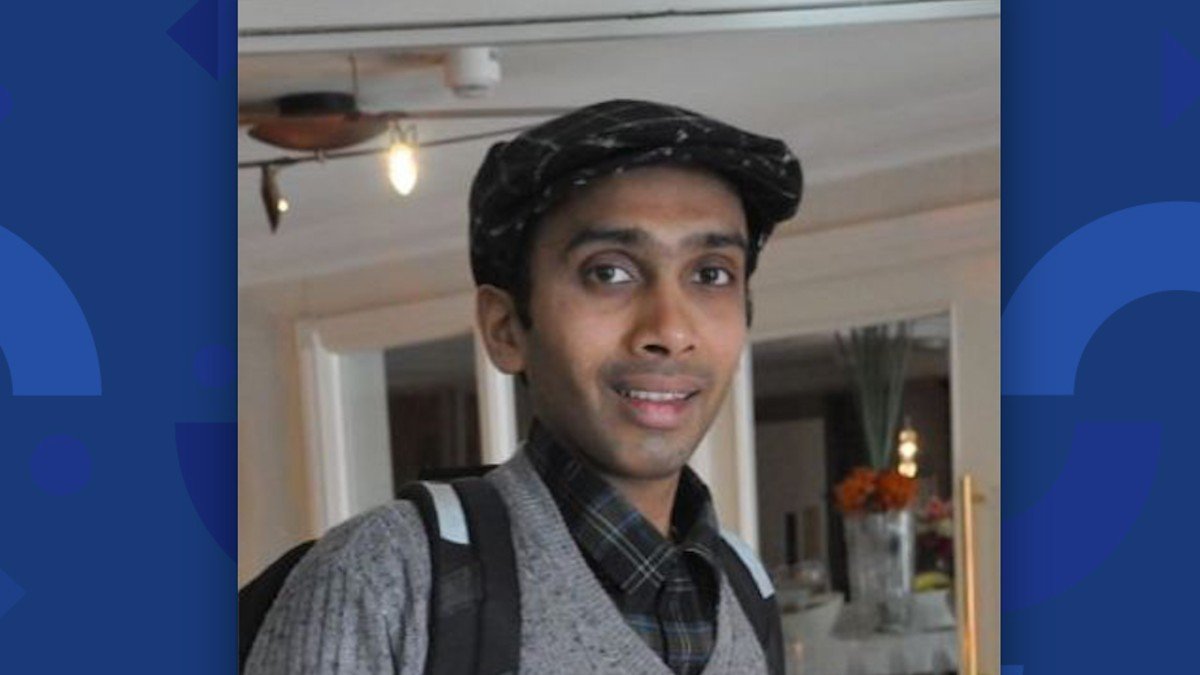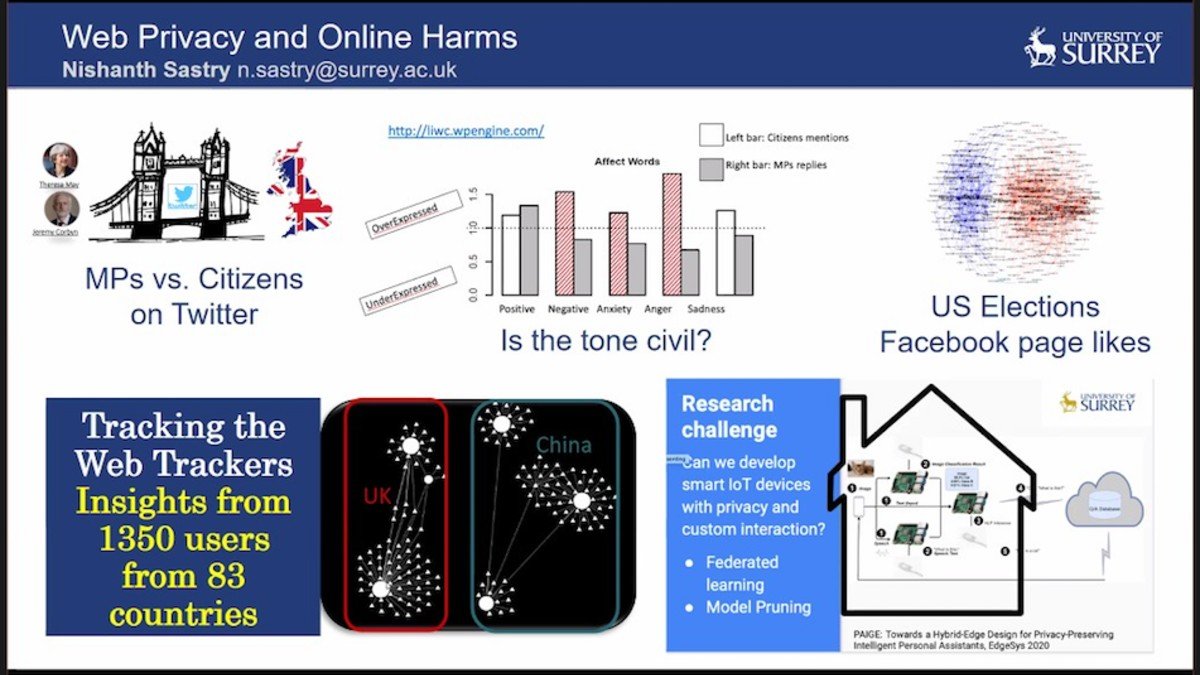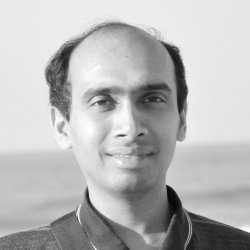Meet the academic: Professor Nishanth Sastry
Professor Nishanth Sastry lectures on computer and social networks in our Computer Science Research Centre. He's also Research Director for Computer Science and Associate Head of School for Research and Innovation. He brings a huge amount of teaching and research experience, benefitting students and colleagues alike here at Surrey!

Nishanth reckons his current career journey may mean he'll end up teaching at the North Pole!
How did you get into computer science?
It happened by accident. I did well in an end-of-school exam and I didn’t know what to do next. I took a computer science degree because it was the preferred subject to take at the time. I’d never even used a computer before and I didn’t have one in my house until my second year of undergraduate study.
You’ve worked and studied all around the world, haven’t you?
I was born in Bangalore, which is essentially the Silicon Valley of India. After my degree, I joined US company Cisco Systems, who’d set up offices in Bangalore.
A year later, I went to the University of Texas in Austin to study for a masters. A job at IBM followed, so I went to Boston, Massachusetts. There I decided I liked research, so I ended up going to Cambridge in the UK. Apart from my current role at Surrey, I’ve been heading increasingly northwards. Who knows? I may end up teaching at the North Pole at some point!
What are your areas of research?
I investigate different kinds of networks. I started off by looking at computer networks and I've also studied social networks as well. Both of these are constructed in similar ways. Single entities, such as people in social networks or nodes in computer networks, are linked together by mechanisms, like friendships in the former or wired and wireless connections in the latter.
My approach in analysing either type of network is to take a large data set and look for patterns in how the networks operate. I then see how we can improve their operation.
Can you give us an example of this?
I've analysed video streaming on BBC iPlayer. The BBC let us view a large anonymised data set of accesses to the service. We used it to see if we could predict what certain people would watch when. Using this, we suggested a new kind of system architecture that could reduce the load at times of peak demand by 50-70 per cent.
In the case of social networks, I started a new facet of an ongoing project with the House of Commons in January. The goal is to examine how citizens in the UK engage online with their MPs on Twitter.
You also research online hate speech?

There are two projects. The first is with The Alan Turing Institute. What we found is there are many different platforms and tools for promoting hate speech online, but they don’t get benchmarked against each other. So, if an activist wants to study and highlight the spread of hatred or if an academic wants to investigate it, which platforms or tools should they use?
We’ve created a meta tool capable of applying multiple tools to obtain a combined output.
What’s the second project?
It’s an offshoot of the above and we use this meta tool to analyse the type of hate speech MPs receive. There are many kinds of hate speech. There’s the overt and criminal type that uses abusive and offensive language. It can be directed at female MPs because of their sex and it can involve racial slurs if MPs are from BAME backgrounds.
But there’s more subtle hate speech that isn’t legislated for. And we’re interested in that, too.
We have a large dataset of tweets by and directed towards all the MPs who are on Twitter and we’re analysing that. It allows us to place comments in the context of longer exchanges, which may affect how we view it.
Ultimately, it will help us understand what types of situation or exchanges create hate speech. It may help us draft guidelines for how we can diminish the likelihood of hate speech occurring on a more widespread basis.
What exciting projects are you working on at the moment?
Sure, let me tell you about LEOScope! This is a global testbed that we’ve initiated here at Surrey. Initially this was in collaboration with Microsoft Research, and Telefonica Research were also involved. Now, several other global entities are also contributing. We have a presence in five continents, including Antarctica, where we are doing- to our knowledge - the first measurements of internet connectivity via LEO satellites.
In addition, we’ve also developed Xeoverse (originally LEOVerse), a scalable digital twin which can handle the details of thousands of satellites on a single machine. The simulation runs in real time, which is crucial for testing, visualisation and operations.
What modules are you teaching on?
I teach on a module called Advanced Challenges in Web Technologies. We look at big online systems, such as Twitter, Google, Facebook and Netflix, and analyse how they’re built and what helps make them efficient. I also talk about how we build resilience into these systems to protect them from failures due to malfunction or cyber attack.
One example of the type of system failure I talk about involves the Boeing 737 Max. A software malfunction was responsible for the grounding of the entire fleet and this was one of the most successful lines of aircraft to ever fly. So, how did this error creep in and what lessons can we learn?
Tell us about your other roles here at Surrey.
Soon after joining in 2020, I got the opportunity step in as Research Director for Computer Science, which allowed me to contribute to our overall research strategy. I instituted new procedures to support grant submissions (like round-table feedback sessions and support for crafting effective responses to grant reviews) which brought more research income to Surrey.
I also serve as the Associate Head of School for Research and Innovation. We have developed ways to support new staff members with their first grant applications, and to help postgraduate and postdoctoral research students develop skills which prepare them for industry (and academic) jobs.
We are developing new ways to encourage interdisciplinary collaborations across the different research centres within the school, and also looking into how we can support mid-career researchers to develop into world leaders.
I also believe strongly in the central role of Equality, Diversity and Inclusion (EDI) for promoting research excellence, and sit on the Engineering and Physical Sciences Research Council's EDI and Skills Strategic Advisory Network.
And beyond Surrey?
In the past couple of years, I have been fortunate to get a chance to take my learnings at Surrey to the national stage, through being selected to the Research Excellence Framework (REF) 2029 panel on Computer Science and Informatics, and the Digital Security and Resilience Strategic Advisory Team for the UK’s main funding body, the Engineering and Physical Sciences Research Council (EPSRC).
Going beyond the UK, I am also an ACM (Association for Computing Machinery) Distinguished Speaker, which gives me a platform to bring my research to the entire world.
Why should people study computer science?
As the world becomes increasingly digital, it’s the language you need to know. People sometimes say they don’t need to study maths because they don’t use it. But that's not true.
"Everyone uses maths in some capacity. It’s the same with computing. It’s a global language that everyone has to understand."
Think about the world during the pandemic, too. Computing has allowed us to connect like never before. During the Great Plague, Sir Isaac Newton fled London to his family home in Lincolnshire. In isolation, he managed to formulate the theory of gravity when an apple dropped on his head. But most of us aren’t Newton-level geniuses. We need to be inter-connected for research and social reasons and computer-based systems, such as the internet, Zoom or WhatsApp, are helping us stay in touch virtually, even when we can’t physically.
Finally, how do you relax away from research?
I read and I listen to podcasts. I also sing and I practise karnatic music, which is the classical music of southern India.
Find out more about studying in our Computer Science Research Centre.
